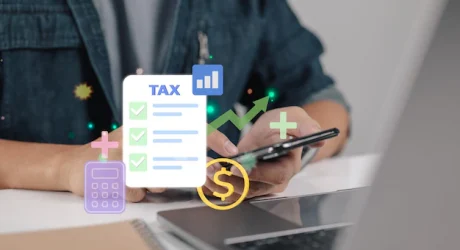In the turmoil of the modern unsettled economic system, keeping more money in your pocket or focusing on savings are both important. However, paying taxes is a common concern for all.
Every tax year ends on the 5th of April!
A new beginning with some compliance changes happens every year by removing unused tax compliances.
The rising cost of living with inflation is putting real tension among modern families. From household budgets to luxury, everything is getting sky-high, which makes investments a must-go process.
In such conditions, making the most of your tax allowance is the best solution to live your life the way you want. So, the condition is to pay less tax while keeping more money with you.
Is that possible?
Well, if planned properly.
Confused?
Dont worry!
We have covered you with all the efficient tax-saving tricks for the next financial year.
Why Is Tax Such A Big Deal?

People often go for a perfectly optimized investment strategy these days. With social media influencers and all the financial burden, they have understood one thing: investment is a big necessity in the contemporary world.
However, creating wealth is easy in our society with all the critical investment plans. But what about maintaining and growing it further?
Do you have a plan for it?
Unchecked tax requirements can be a major loophole in your financial planning. Where the top tax rate is around 45%, you cannot ignore the payments.
What to do?
Well, a thorough tax strategy before all investments can be a big positive move this year. If you want a perfectly optimized investment plan, never overlook the tax drags!
Fortunately, there are some legal ways to help minimize your tax payments. Now, with us, you have the opportunity to grow your investment opportunities while losing less on taxes.
Tricks To Pay Less Tax This Year

Tax is an inevitable part of our lives, but there are ways to reduce the amount you pay. With the right knowledge and planning, you can legally minimize your tax bill and keep more of your hard-earned money.
Here, we will share some effective tricks and tactics that can help you pay less tax this year. Whether you are self-employed, a small business owner, or an individual taxpayer, these tips can be incredible to pay less tax.
So, let’s dive in and explore some of the best tax-saving strategies you need to know.
1. Maximize Your Tax Savings With The Annual Isa Allowance
The annual ISA allowance is one of the most efficient tax-saving processes offered by the UK government. If you are 18+ and a resident of the UK, then you have a golden opportunity to invest in Stocks and Shares ISA!
Well, the annual allowance this year is fixed to £20,000!
However, the mentioned amount is only tax-free, as you have the opportunity to invest more with taxable prominence.
Well, the best part is that you do not have to pay any capital gains tax. So, when selling your stocks and shares, you will be able to bypass all the taxes.
Remember that you cannot directly move your shares to individual savings accounts (ISA).
2. Watch Out For Capital Gains Tax
As a UK taxpayer, you can realize certain gains without paying capital gains tax (CGT) every year. The CGT allowance for the 2023/2024 tax year is £6,000. However, it’s important to note that from April 2024, the CGT allowance will drop from £6,000 to £3,000.
This highlights the significance of ISAs and pensions. It’s worth remembering that if you realize a gain on anything held in an ISA or pension, it won’t use your CGT allowance.
Therefore, planning your investments wisely and taking advantage of tax-efficient options like ISAs and pensions to maximize your returns while minimizing your tax liabilities is essential.
Related: How Cheap Tax Returns Work And Why You Should Be Careful
3. Divide Your Assets
If you are married or in a civil partnership, knowing the special rules around gifting assets is important. The good news is that if you gift or sell something to your spouse or civil partner, you don’t need to pay tax on those assets.
For instance, as a married couple, you could realize gains of up to £12,000 without having to pay any capital gains tax.
So, if you are planning to make any significant financial transactions, it’s worth considering these rules and how they can help you minimize your tax liabilities.
It’s always important to plan your investments wisely and take advantage of tax-efficient options to make the most of your returns while minimizing your tax obligations.
4. Make The Most Of Your Personal Savings Allowance
It’s great that you can earn up to £1,000 in savings interest tax-free with the Personal Savings Allowance (PSA). The amount of tax-free savings you can earn depends on your tax bracket.
So, making the most of this allowance is important by earning a good interest rate on your cash. This way, you can maximize your savings and keep more money in your pocket.
5. Pay Money Into The Pension
Are you worried about saving enough for your retirement?
Well, there’s good news for UK residents!
Adding money to a pension can be one of the most tax-efficient ways to save for your golden years.
If you are under 75 years old and a UK resident, you can invest as much as you earn. This means that you can reduce your tax bill while building up your retirement fund.
Most people can pay up to £60,000 a year, which is the current annual allowance.
However, the amount you can contribute can depend on how much you earn or if you’ve already taken money from a pension.
So, checking the rules and regulations before investing in your pension plan is always important.
Speak To A Financial Adviser Before Making Any Decision

When it comes to managing your finances, it’s always wise to seek professional advice before making any major decisions. This is particularly true when it comes to tax planning and investments.
While there are plenty of resources available online that can help you understand the basics of tax planning and investment strategies, it’s important to remember that every individual’s financial situation is unique. What works for one person may not work for another.
This is why it’s essential to speak to a financial adviser before making any significant financial decisions.
Read Also:




























